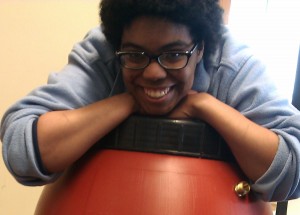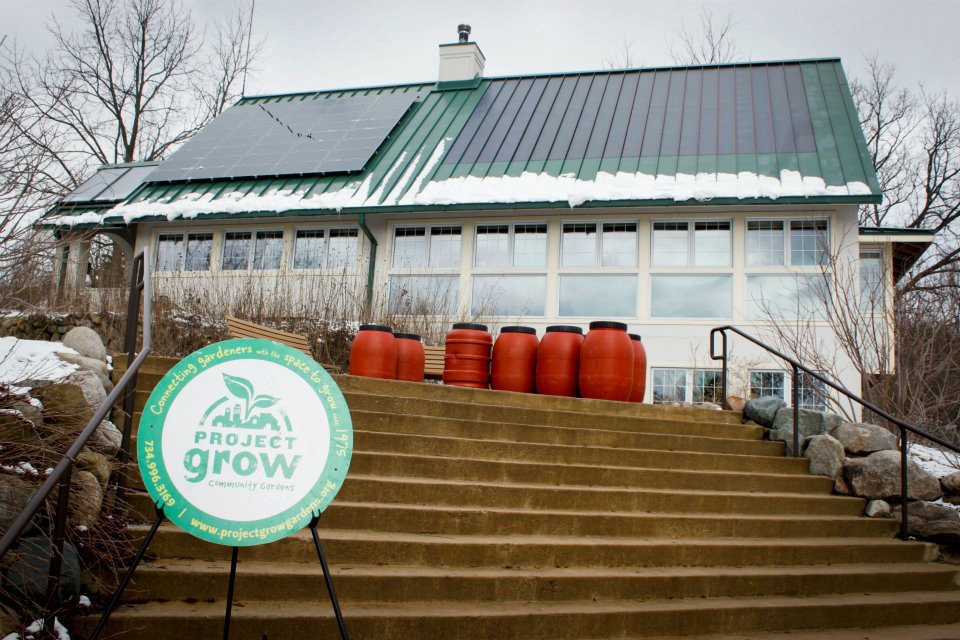
A couple of weeks ago, my wife, Chrissy and I headed over to the Leslie Science and Nature Center in Ann Arbor, MI to take part in a workshop on building your own rain barrel. The workshop was organised by Project Grow – a private, non-profit organization supporting community gardening in the Ann Arbor area – in partnership with Maxi Container, Inc. – a local, family-owned and operated Detroit-based company.
The cost for participation in the workshop covered all the pieces in the rain barrel kit, including the barrel, brass fittings, and caulk as well as a donation towards the Leslie Science and Nature Center. The barrels used in the workshop were food-grade, having originated overseas filled with pickles, olives and other tasty morsels. Unlike their darker cousins, which are used to store solvents and other nasty chemicals, these food-safe, terracotta-colored containers are perfect for storing water that ultimately waters gardens. Their re-appropriation as rain barrels is one of several recycling kits provided by Maxi Container, which also include composters and drum stoves.
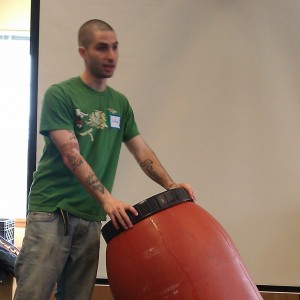
The workshop was introduced by Lucas DiGia, the Vice President of Project Grow who then handed over to Josh Rubin, the Creative Director of Maxi Container, Inc. and grandson of its founder, Max Rubin.
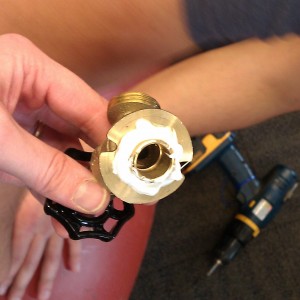
Josh started out with a demonstration of how to make the rain barrel, ably assisted by Lucas. Each rain barrel had been pre-drilled to provide a hole for the rain to get in at the top and another for it to get out again at the bottom. The first step was to fit a faucet in that lower hole. Caulk was applied around the back of the brass fixture where it would meet the barrel, then the faucet was inserted (with the application of a little brute force).
At this point, it was time for power tools. Even though the barrels had been pre-drilled with two holes, another hole was required for the overflow. This step had been left for us to do because its placement had to be chosen with an idea of where the rain barrel would ultimately be used. With Lucas steadying the barrel, Josh carefully drilled the third hole. The overflow fixture (suitable for attachment of any regular garden hose) was screwed into place using a wrench.
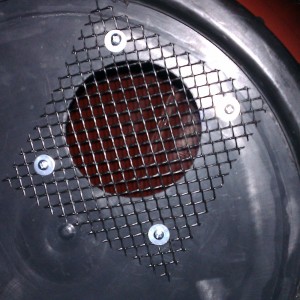
The final touch for the rain barrel was to affix a mesh over the inlet hole. This mesh not only prevents debris from entering the rain barrel but it also provides a base over which to scatter pebbles. The pebbles discourage mosquitoes from using the rain barrels for their offspring, avoiding the need for mosquito tablets to be added to the barrel.
And that was that. With Josh's demonstration over, the workshop participants were directed to complete their own rain barrels, with appropriate over sight and assistance from Josh, Lucas and the Project Grow volunteers. Chrissy and I managed to get our rain barrel completed quite quickly, barring a few arguments over who got to use the power tools. It's now sitting in the garage waiting for a sturdy base to be built for it to stand on – a full water barrel of this size will weigh over 300lbs!
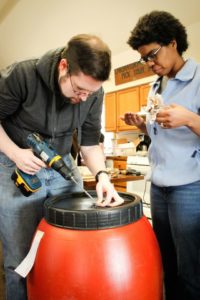
Overall, this was a thoroughly enjoyable experience. This is in no small part due to the efforts of Project Grow and Maxi Container, Inc. I would encourage others to attend the next workshop Project Grow is considering for later in the year. If you can't make a workshop, check out the kit on Maxi Container's website. Finally, you can check out more pictures from the workshop over at Project Grow's page on Facebook.
